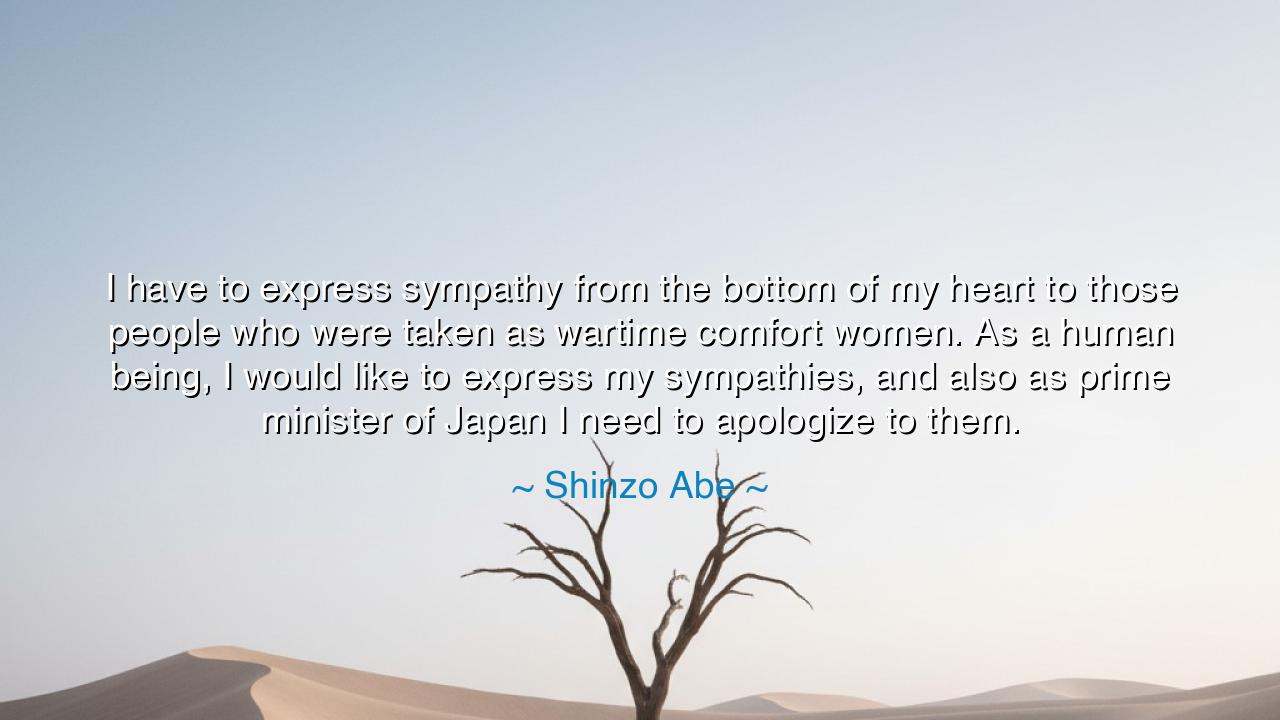
I have to express sympathy from the bottom of my heart to those
I have to express sympathy from the bottom of my heart to those people who were taken as wartime comfort women. As a human being, I would like to express my sympathies, and also as prime minister of Japan I need to apologize to them.






When Shinzo Abe, Prime Minister of Japan, declared, “I have to express sympathy from the bottom of my heart to those people who were taken as wartime comfort women. As a human being, I would like to express my sympathies, and also as prime minister of Japan I need to apologize to them,” he gave voice to one of the deepest struggles of nations and leaders: how to face the shadows of history with both honesty and humility. His words speak to the eternal tension between memory and responsibility, between the suffering of the past and the duty of the present.
The heart of this statement lies in the duality of Abe’s position. He speaks both as a human being and as prime minister. As a man, he recognizes the immense suffering endured by the women who were forced into servitude during Japan’s wartime past. His sympathy is personal, flowing from the heart, acknowledging their pain as a fellow mortal. But as a statesman, he carries the burden of history—the need to apologize not only as himself but as the voice of a nation that once inflicted this injustice. Here lies the true weight of leadership: to bow one’s head not only for one’s own sins, but for the sins of those who came before.
The tragedy of the comfort women remains one of the darkest wounds of the twentieth century. Thousands of women from Korea, China, the Philippines, and other occupied lands were taken by force, robbed of their dignity, and treated as instruments rather than human beings. Their suffering lasted long after the war ended, for the silence of society and the reluctance of governments to fully recognize their plight compounded their pain. Thus, Abe’s words—though late—carried the weight of an acknowledgment long demanded by history and by survivors who endured into old age.
History offers many parallels. When Willy Brandt, Chancellor of West Germany, fell to his knees in Warsaw in 1970 before the memorial to the Jewish ghetto uprising, he too confessed the sins of a nation he himself had not committed. His act was both personal and political, a recognition that some wounds can only be approached with humility and apology. Abe’s declaration belongs to this lineage: an attempt to reconcile a people with their past, and to offer the balm of sympathy and apology to those who suffered unspeakable wrongs.
The lesson, O seekers of wisdom, is that the past must not be buried in silence, for wounds ignored will fester, and sorrows denied will only deepen with time. True healing requires acknowledgment, and acknowledgment demands both sympathy for the victims and responsibility from those who inherit the name of the wrongdoer. Even if the sins are of ancestors, the duty of the living is to face them with truth and humility, for only then can reconciliation be born.
Practical action lies here: in your own life, do not turn away from past wrongs—whether personal, familial, or communal. When harm has been done, acknowledge it openly, even if it was not your hand that dealt the blow. Offer sympathy sincerely, and when needed, offer apology. For the greatness of a person, and of a nation, is not in denying imperfection but in facing it with courage and a will to make amends.
Therefore, let Abe’s words stand as both warning and example: the duty of remembrance is eternal, and the responsibility to apologize and heal lies not only in individuals but in leaders and nations. To express sympathy and apology is not weakness but strength, for it is the first step toward reconciliation, the first gesture toward peace. May all who carry the burden of history learn this truth: that only by facing the past can the future be freed from its chains.






AAdministratorAdministrator
Welcome, honored guests. Please leave a comment, we will respond soon